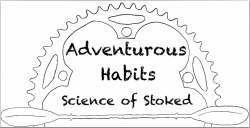It's a week past Thanksgiving, but are you still practicing feeling grateful? You might want to get
Gratitude - the feeling of being grateful, counting your blessings, and giving thanks - can be more effective than Prozac. Scientists have called it 'The Magic Pill' for happiness. I know - seriously?!
In 2003, Bob Emmons and Mike McCullough published a series of studies in which they had groups of people writing in journals for just a few minutes every day or once a week, and studied their responses. One of the groups was instructed to write about their daily or weekly hassles, another group wrote neutral comments, and the last groups listed the items for which they were grateful.
They found that those who kept a daily gratitude journal had not only an increased state of well-being, but also got better sleep, had more willingness to accept change, and even had reduced feelings of physical pain.
In a 2008 study using functional MRI to study the brain, researchers noticed that subjects experiencing gratitude were influencing their hypothalamus.
Not hippopotamus.
Hypothalamus.
It's this small part of your brain that influences sleep, eating, and stress (along with regulating other processes). Simply expressing gratitude can help you get better sleep, have better eating habits, and reduce stress. It can even help you learn - gratitude has been shown to produce dopamine - one of the chemicals that your body uses to encourage learning behavior through reward (dopamine makes you feel good). So that also means that dopamine makes you feel good - feel happy. Showing gratitude makes you feel happy.
There are a couple of take-away's here:
1. Gratitude is a practice. Taking as little as one minute every day to practice it by writing three things that you are grateful for in a journal that you keep on your bedside table can increase your well-being and happiness.
2. You should feel free to express gratitude to people often. Because 'Thank you' is somewhat of a tired old phrase, you may want to experiment with making a point of explaining 'I really appreciate you for...'
3. Remember to be Grateful even during the tough times. Bob Emmons - the leading researcher on gratitude and the author of the 2003 study mentioned above - notes that "Our national holiday of gratitude, Thanksgiving, was born and grew out of hard times. The first Thanksgiving took place after nearly half the pilgrims died from a rough winter and year. It became a national holiday in 1863 in the middle of the Civil War and was moved to its current date in the 1930s following the Depression." Did you know that? I didn't. But I am sure grateful that I do now.
Before you go get all grateful on me, I want to give you one more thing to be grateful for: an awesome Gratitude Resource. The Greater Good Science Center - The Science of A Meaningful Life is all about effectively communicating take-aways from the recent advancements in the science of living with meaning. Often, the advice from their articles consists of small habits that add up to a huge impact on your life and the lives of those around you! Self-experiment with them for yourself!
With gratitude y'all!
marshall moose
Gratitude - the feeling of being grateful, counting your blessings, and giving thanks - can be more effective than Prozac. Scientists have called it 'The Magic Pill' for happiness. I know - seriously?!
In 2003, Bob Emmons and Mike McCullough published a series of studies in which they had groups of people writing in journals for just a few minutes every day or once a week, and studied their responses. One of the groups was instructed to write about their daily or weekly hassles, another group wrote neutral comments, and the last groups listed the items for which they were grateful.
They found that those who kept a daily gratitude journal had not only an increased state of well-being, but also got better sleep, had more willingness to accept change, and even had reduced feelings of physical pain.
In a 2008 study using functional MRI to study the brain, researchers noticed that subjects experiencing gratitude were influencing their hypothalamus.
Not hippopotamus.
Hypothalamus.
It's this small part of your brain that influences sleep, eating, and stress (along with regulating other processes). Simply expressing gratitude can help you get better sleep, have better eating habits, and reduce stress. It can even help you learn - gratitude has been shown to produce dopamine - one of the chemicals that your body uses to encourage learning behavior through reward (dopamine makes you feel good). So that also means that dopamine makes you feel good - feel happy. Showing gratitude makes you feel happy.
There are a couple of take-away's here:
1. Gratitude is a practice. Taking as little as one minute every day to practice it by writing three things that you are grateful for in a journal that you keep on your bedside table can increase your well-being and happiness.
2. You should feel free to express gratitude to people often. Because 'Thank you' is somewhat of a tired old phrase, you may want to experiment with making a point of explaining 'I really appreciate you for...'
3. Remember to be Grateful even during the tough times. Bob Emmons - the leading researcher on gratitude and the author of the 2003 study mentioned above - notes that "Our national holiday of gratitude, Thanksgiving, was born and grew out of hard times. The first Thanksgiving took place after nearly half the pilgrims died from a rough winter and year. It became a national holiday in 1863 in the middle of the Civil War and was moved to its current date in the 1930s following the Depression." Did you know that? I didn't. But I am sure grateful that I do now.
Before you go get all grateful on me, I want to give you one more thing to be grateful for: an awesome Gratitude Resource. The Greater Good Science Center - The Science of A Meaningful Life is all about effectively communicating take-aways from the recent advancements in the science of living with meaning. Often, the advice from their articles consists of small habits that add up to a huge impact on your life and the lives of those around you! Self-experiment with them for yourself!
With gratitude y'all!
marshall moose


